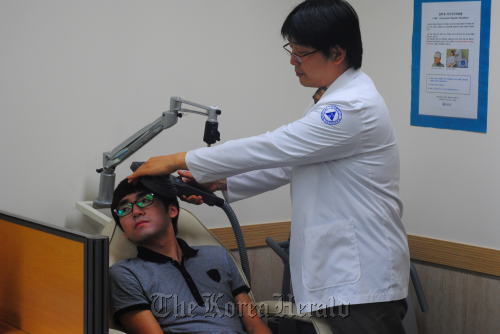Save Brain Clinic uses three methods – medication, non-medication, rehabilitation
GONGJU, South Chungcheong Province ― Choi, like any average 16-year-old boy, loves to play computer games, spending hours at a time in front of his monitor.
But thanks to his hobby, Choi has missed countless school days, stolen money from his peers and family, and even self-harmed.
“I missed school so I could play computer games,” Choi told The Korea Herald, nervously avoiding eye contact.
Choi, who declined to give his full name, has been playing online computer games since he was a little child, but things took a turn for the worse three years ago.
Once his mother caught wind of Choi’s addiction, she tried everything to limit his playing, and resorted to taking away the family computer when leaving him unattended.
One afternoon, Choi, overcome by a sudden urge to play, punched through the window of his parents’ bedroom, in the hope that his monitor was locked up inside.
The monitor was not there, and Choi’s arms, cut on the glass, were gushing blood.
Choi tried to clean up the pools of blood, but his mother came home to what seemed like a desperate cry for help.
But in one of the most wired countries in the world stories like Choi’s are not unheard of, nor is his the most serious case to have been reported.
Last year, parents addicted to online gaming neglected their 3-month-old daughter, eventually leading to her death. Sadly, this was not the first case of parental neglect from online gaming leading to the death of an infant here.
At the Gongju National Hospital in South Chungcheong Province, the Save Brain Clinic is working to rehabilitate Choi and others like him, case by case.

Lee Jae-won uses transcranial magnetic stimulation to help activate nerve cells in the brains of patients addicted to online gaming at his clinic in Gongju, South Chungcheong Province. (Robert Lee/The Korea Herald)
Lee Jae-won, head of the nation’s first specialized Internet addiction clinic, has seen first hand the physical effects that Internet addiction has on the brain.
“We can detect a lot of abnormalities in the prefrontal cortex part of the brain in Internet addicts,” said Lee, showing images of the brain that were clearly different from brains of people who were not addicted.
Lee added that no matter how complicated a computer game may be, it only stimulates a minute part of the brain.
But with Internet addiction emerging as a relatively new field, many experts agree there is no set or simple cure.
At the Save Brain Clinic, Lee has three main methods of treatment; medication, non-medication and rehabilitation.
“Nothing is more effective in returning the brain’s functionality than medication,” Lee said.
Lee, noting the similarities between attention deficit hyperactivity disorder and Internet addiction, decided to use transcranial magnetic stimulation, a technique used to treat those with ADHD.
TMS is a therapy that uses magnetic fields to fire neurons in the brain, essentially working out the brain.
And one of the biggest problems with Internet addict patients is the loss or lack of social skills.
“Online gaming addicts play for such a long time that they usually forget how to do anything else, like socializing with other people,” said Lee.
Gaming addiction can become a catch-22, where many turn to the Internet because they have difficulty making friends or are severely introverted and shy in real life, according to Lee.
Kim, who declined to give his real name, had also been battling with similar demons. After continually brushing off the issue, he could not take any more and decided to admit himself to the clinic.
“Everything just sort of piled up into a breaking point,” Kim said.
Kim, in his late 20s, not only lost a lot of opportunities in his life, but his health deteriorated as well, after more than 10 hours of game play at a time.
But since being at the clinic, even the simplest things have started to help Kim, who said his daily routine has normalized and he has started to regain his health.
Since Korea’s first online gaming-related death in 2002, the country has been the focus of international attention regarding the issue.
“Many in the field believe that we are simply the first country to feel the hit,” said Lee.
“The world is watching us to see how we handle the issue, and to see what policies do and do not work here.”
According to a recent survey by the National Information Society Agency, some 12.4 percent of teens and 5.8 percent of the adult population are estimated to be addicted.
But Lee and other doctors at the clinic agree these estimates may be too high, citing that the pervalence of even the most prominent mental disease is nowhere near that percentage of pervalance.
The figures portrayed a downward trend since 2004 when the NIA first started conducting the survey.
Despite the decreasing numbers, the problem remains, and the spotlight will be on Lee and others in the field to help solve it.
By Robert Lee (robert@heraldcorp.com)






